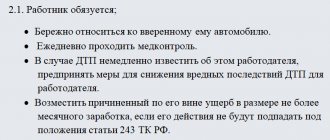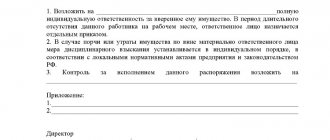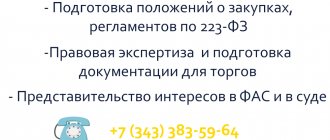Who is responsible for violating sanitary legislation is a question that would most correctly be answered this way: the one who violates it. Due to the vastness and universality of the designated legislative segment, anyone can commit illegal actions: an ordinary citizen, an organization, an entrepreneur, etc. To understand whether you can be held responsible for a particular act, you need to find out in what cases the liability we are interested in will occur and in what measures it will be expressed.
Who is responsible for violating sanitary laws?
Administrative liability for violation of sanitary legislation
So, administrative liability for violation of sanitary legislation occurs in a number of cases stipulated by law.
Category of violations related to the operation of buildings and transport
This category of illegal actions includes violations in the following areas of the legislative segment of interest to us:
- compliance with the standards and requirements imposed directly on residential premises;
- operation of premises intended directly for production purposes, as well as public areas;
- the use of various buildings, structures, as well as the equipment located in them;
- use of transport.
Administrative liability involves the imposition of such a punishment on criminals as a fine
Provided that you have violated the law in one of the above areas, the citizen may face the following penalties:
- an official warning about the consequences that will occur if the indicated violations are repeated;
- the imposition of penalties, the amount of which will vary from five to ten times the minimum wage for ordinary citizens;
- imposition of a fine, the amount of which will be from ten to twenty minimum wages for individual entrepreneurs and persons holding certain government positions;
- imposing a fine on legal entities that have violated the law, the amount of which will vary from one hundred to two hundred minimum wages.
Category of violations related to the handling of food products and raw materials, as well as chemical and biological substances
This category includes violations of the law associated with refusal to comply with requirements associated with the following activities:
- catering for the country's population;
- supply of food products from abroad;
- the use of names that have a production and technical orientation and are potentially dangerous to humans;
- production and use of products used for human household needs;
- production, use and circulation of food additives, industrial raw materials, as well as those production items that come into contact with them;
- the use of chemical or biological substances that are harmful to human health.
Failure to comply with sanitary standards in the field of food hygiene can lead to such catastrophic consequences as mass poisoning, mass disease, etc.
Violation of the above points entails the imposition of a fine in the form of a monetary payment, the amount of which will vary depending on who it is imposed on.
- So, if we are talking about paying a fine by an ordinary citizen, he will have to part with ten to fifteen times the minimum wage.
- For individual entrepreneurs and citizens holding government positions, this amount will be no less than twenty and no more than thirty minimum wages.
- As for sanctions for legal entities, the amount of the fine that is relevant for them will be from two hundred to three hundred minimum wages.
Why is there such a clear difference between the fine amounts? Everything is simple here: the responsibility in the field of compliance with sanitary legislation concerning legal entities is inherently much more serious than that assigned to other categories of persons. In addition, disturbances caused by entire formations, as a rule, also always have a significant scale.
Depending on which category the person we are interested in, who is a violator of sanitary legislation, belongs to, the penalties applicable to him will ultimately differ.
Category associated with violation of sanitary requirements in the field of use of water resources, land and air masses
Thus, in the paragraph under consideration it is advisable to include a number of the following areas of human activity in which violations in the area of interest to us may arise:
- compliance with sanitary and epidemiological standards regarding the country’s water infrastructure, drinking water and drinking supplies to the population;
- following the rules for the use of atmospheric air masses on the territory of urban, rural and other settlements, as well as air accumulated directly in places where people stay, temporary or permanent;
- use in accordance with the rules of soil, territories of settlements, sites, and its maintenance in accordance with legal norms;
- processing of production and consumption waste, the cycle of which includes both collection and disposal, transportation, further storage, etc.;
- planning construction processes and implementing them through the construction of buildings in the city and rural areas.
In some cases, when minor violations are committed, it is possible to apply the most generous punishment in the form of an official warning. If the unlawful act is repeated, more significant measures will subsequently be applied.
Violations in the listed areas also imply the imposition of a certain type of punishment, namely:
- official warning;
- imposing a fine.
Financial liability will be imposed, as before, on:
- ordinary citizens;
- representatives of categories of individual entrepreneurs and officials;
- legal entities.
Thus, they will all again part with a certain amount of the minimum wage. So, for example, citizens will part with ten to fifteen designated values, entrepreneurs and persons holding government positions will allocate from twenty to thirty minimum wages, but legal entities, which, as we remember, pay the most, will be forced to pay a fine to the treasury , the value of which will be from two hundred to three hundred minimum wages.
Category of violations related to the requirements in the field of sanitary and epidemiological legislation related to working conditions, training, work
It is also of great importance to comply with the legislation of the category of interest to us in the field of creating favorable and suitable working conditions, as well as conditions for carrying out educational work and work related to the training of citizens.
In addition, it is very important to organize correctly labor interaction with sources of factors of physical impact on humans, various substances of the biological category, microbiological organisms, toxins, etc. If you violate the law in this area, you will be held accountable to the fullest extent of the law. The following division of penalties for categories of persons already known to us is assumed:
- ordinary citizens of our country will get by with a warning or a fine;
- the entrepreneurial layer of the population and officials will suffer losses in the form of twenty to thirty minimum wages;
- legal entities will spend from two hundred to three hundred minimum wages on compensation for unfulfilled obligations.
It is imperative to properly organize the interaction of a citizen with sources of chemical, physical, etc. effects on the body, provided that it works with this source
Failure to implement preventive measures
Each organization is obliged to carry out sanitary and anti-epidemic measures. If you refuse to carry them out, miss deadlines, disrupt the normal course of these activities and other violations, the following consequences may occur:
- the entrepreneurial layer of the population and representatives of government positions will be forced to pay as a fine the minimum wage of thirty or forty times the amount;
- legal entities, according to tradition, will have to part with approximately three hundred to four hundred times the minimum wage currently established for the Russian Federation.
Provided that there has been a violation of sanitary legislation, administrative liability is imposed on the guilty person by issuing a corresponding resolution of an authorized official holding a post in the organization exercising state control in the field of sanitary and epidemiological legislation.
As for the production process that begins after the issuance of a decision, it is regulated by the procedure that was previously established by the Code of our country regulating relations in the field of violation of administrative order.
The imposition of administrative liability on a citizen is carried out by issuing a corresponding resolution by an official
Disciplinary liability for violation of sanitary legislation
As for disciplinary liability, the law determines that officials, employees of any organizations or enterprises who have violated the law in the area of interest to us must be subject to penalties directly at the place of work. These penalties may take the form of:
- suspension from work;
- dismissal from a position;
- layoffs, etc.
The responsibility for imposing penalties falls on the shoulders of the management team of enterprises. At the same time, all activities related to this process are carried out on the recommendation of the chief government doctor or his deputy.
Criminal liability is assigned in accordance with the Criminal Code of our country and its specific provisions
Criminal liability for violation of sanitary legislation
The Criminal Code of our country also provides for a corresponding range of penalties for violating the rules in the field of sanitary and epidemiological legislation. So, if the actions of a person, committed through negligence, resulted in the occurrence of a mass disease of citizens, their poisoning and similar consequences, the offender will have to:
- pay out of your own pocket a fine of up to 80 thousand Russian rubles;
- pay a fine in the amount of wages or other total income accumulated over 6 months;
- lose the right to accept a certain position;
- lose the right to conduct a specific activity for a period of up to three years;
- attend compulsory work for up to 360 hours;
- attend correctional labor for up to one year;
- be imprisoned for up to a year.
Provided that the same act resulted in the death of a person or several citizens, the list of punishments will be as follows:
- compulsory work for a period of up to 480 hours;
- correctional labor from six months to two years;
- forced labor for a period of up to five years;
- imprisonment for up to five years.
Which punishment will be determined for the guilty citizen will be decided in each specific case by the judiciary
Pay for frivolity
The current version of the Code of Administrative Offenses already includes punishment for violating sanitary rules and failure to comply with sanitary, hygienic and anti-epidemic measures. The fine for this is small - from one hundred to five hundred rubles for citizens. You can even get away with a warning. A legal entity can be fined up to 20 thousand rubles.
The government proposes stricter punishment for violation of such rules if this occurs during an emergency situation or when there is a threat of the spread of a disease, as well as during a quarantine period. Failure to comply with the requirements to carry out sanitary and anti-epidemic (preventive) measures will result in the imposition of an administrative fine. If a citizen violates quarantine, he will be fined from 15 thousand to 40 thousand rubles. If an official is guilty of violating sanitary rules and failing to comply with measures, the fine will range from 50 thousand to 150 thousand rubles. For legal entities - from 200 thousand to 500 thousand rubles. An administrative suspension of activities for up to thirty days is also possible.
The punishment is tougher if these violations lead to harm to human health or death. Let us recall that earlier the State Duma introduced amendments to the Criminal Code, which provide for up to seven years in prison for violating quarantine with grave consequences. And if the actions (inaction) do not contain a criminal offense, then an administrative norm will be applied.
The Cabinet of Ministers proposed the following punishment: a fine for citizens in the amount of 150 thousand to 300 thousand rubles; officials - from 300 thousand to 500 thousand rubles. Disqualification for a period of one to three years is also possible. Individual entrepreneurs and legal entities will be fined from five hundred thousand to 1 million rubles. An administrative suspension of activities for up to ninety days is also possible.
In addition, it is proposed to supplement the Code of Administrative Offenses with a new article providing for liability for “failure to comply with the rules of conduct in the event of an emergency or the threat of one.”
Such violations will result in a warning or an administrative fine. For citizens in the amount of one thousand to three thousand rubles; for officials - from 10 thousand to 30 thousand rubles; for individual entrepreneurs - from 30 thousand to 50 thousand rubles; for legal entities - from 100 thousand to 300 thousand rubles.
If such violations result in harm to human health or property, then a fine may be imposed on citizens in the amount of 15 thousand to 40 thousand rubles; for officials - from 300 thousand to 500 thousand rubles. For individual entrepreneurs and legal entities, the fine will range from 500 thousand to one million rubles or administrative suspension of activities for up to 90 days.
In addition, the draft law gives the right to draw up protocols on administrative offenses to officials of government bodies and the Ministry of Emergency Situations. This applies to cases of failure to comply with the rules of behavior in emergency situations or the threat of its occurrence.
Earlier, the amendments were announced by Prime Minister Mikhail Mishustin - according to him, sanctions are being introduced “for those who refuse to comply with the established rules.” “We will fine citizens, officials, and legal entities,” he emphasized at a government meeting.
The amendments were submitted to the second reading of another bill - on security activities. The second reading is scheduled for March 31. The document is expected to be adopted in its final form next week. If compared with foreign analogues, the proposed measures are more liberal, Vyacheslav Volodin told reporters after a meeting of the State Duma Council. “We don’t want to punish anyone, but citizens must understand that it is important to organize themselves,” he said. “If a person has given up on himself, then let him at least think about those around him.”
The measures in the Code of Administrative Offenses are balanced - just like the amendments to the Criminal Code previously proposed by deputies, Volodin believes. The proposals will be supported by all factions, he is sure - the deputies, according to him, believe that these are important measures that can stop those who act carelessly, without thinking about others.
Who can be fined for violating quarantine? "Coronavirus review" of the Supreme Court
Due to the fact that the objective need urgently required the formation of uniform judicial practice and the application of legislation on numerous issues related to the application of measures aimed at countering the spread of the new coronavirus infection (COVID-19) in the Russian Federation, the Presidium of the Supreme Court April 21, 2021 approved the Review of judicial practice on “coronavirus” issues. Among the numerous issues that were examined in detail by the RF Armed Forces, the following were explained:
- Issues of application of procedural legislation;
- Issues of application of civil legislation regarding the application of limitation periods, as well as recognition of the epidemiological situation, restrictive measures or self-isolation regime as force majeure circumstances;
- Issues of application of bankruptcy legislation;
- Issues of application of criminal legislation;
- Issues of application of legislation on administrative offenses;
For example, regarding the application of new increased fines that appeared in the Code of Administrative Offenses of the Russian Federation from April 1, 2021, the Supreme Court clarified - to fine for violation of sanitary and epidemiological measures, which entailed a threat of the spread of the disease - under Part 2 of Art. 6.3 of the Administrative Code is necessary for those who do not comply with mandatory quarantine.
It is under this article that it is necessary to qualify the actions of citizens who returned to Russia from other countries, but violated the quarantine conditions and left home earlier than two weeks, and not those who violate the self-isolation regimes introduced by executive authorities.
Also a fine under Art. 6.3 of the Code of Administrative Offenses threatens those who had contact with those infected with coronavirus, but ignored the restrictions required in such cases.
According to the clarifications of the RF Armed Forces, the protocols under Part 2 of Art. 6.3 of the Code of Administrative Offenses may be drawn up by both police officers and officials of “bodies exercising federal state sanitary and epidemiological supervision.”
However, the Supreme Court of the Russian Federation calls on the courts not to blindly assign the maximum or minimum fine under this article, pointing out that:
When deciding whether to impose an administrative penalty of a specific type and amount on a person in respect of whom proceedings are underway for an administrative offense, provided for in Part 2 of Article 6.3 of the Code of Administrative Offenses of the Russian Federation, it is necessary to be guided by the provisions of Chapter 4 of the Code of Administrative Offenses of the Russian Federation and keep in mind that such punishment must meet the requirements proportionality, fairness and proportionality , individualization of administrative responsibility, and also meet the goals of preventing the commission of new offenses both by the offender himself and by other persons.
Answering the question about who can be given an administrative penalty in the form of a warning for committing an administrative offense, provided for in Part 1 of Article 20.6.1 of the Code of Administrative Offenses of the Russian Federation, for “failure to comply with the rules of conduct when introducing a high alert regime in the territory in which there is a threat of an emergency situation , or in an emergency zone,” that is, for violating the self-isolation regime in a subject of the federation, the RF Armed Forces indicated.
What:
Based on the content of this norm, administrative punishment in the form of a warning can be imposed on any subject of an administrative offense (citizen, official, person engaged in business activities without forming a legal entity, legal entity) provided for by this norm, depending on the specific circumstances of the administrative offense case .
I hope that the court will meet you halfway in this matter, limiting itself to a warning, without imposing a penalty in the form of a fine if such a situation occurs.
In addition, if a protocol has been drawn up against you under Part 1 of Article 20.6.1 of the Code of Administrative Offenses of the Russian Federation, then when considering a case of an administrative offense, ask the court to apply Article 2.9 of the Code of Administrative Offenses of the Russian Federation.
If the administrative offense committed is of minor significance, the judge, body, or official authorized to resolve the case of an administrative offense may release the person who committed the administrative offense from administrative liability and limit himself to an oral remark.






